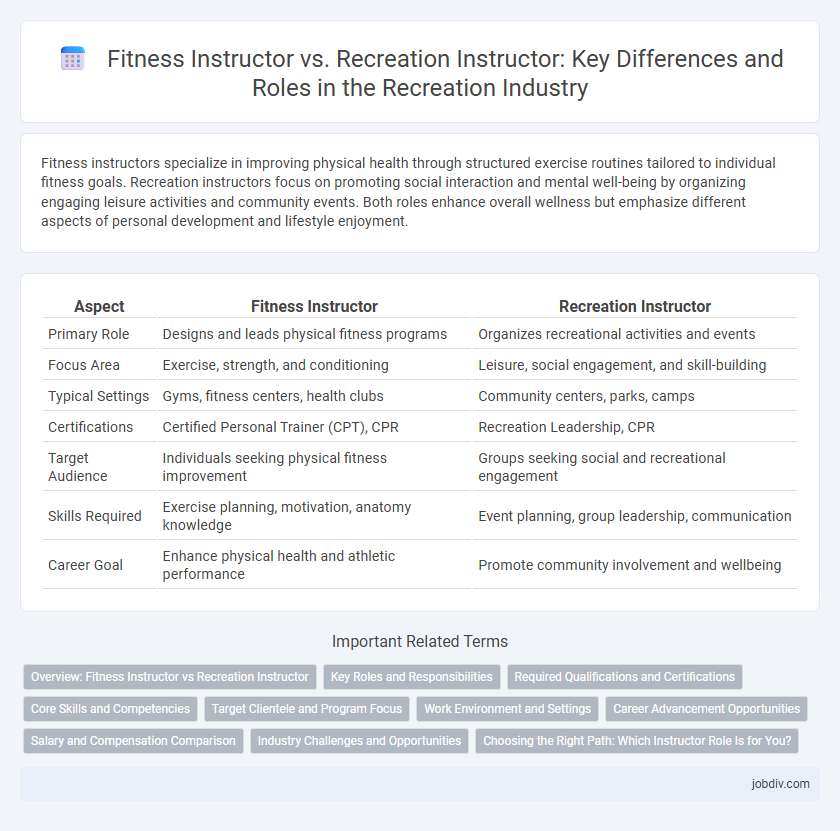Fitness instructors specialize in improving physical health through structured exercise routines tailored to individual fitness goals. Recreation instructors focus on promoting social interaction and mental well-being by organizing engaging leisure activities and community events. Both roles enhance overall wellness but emphasize different aspects of personal development and lifestyle enjoyment.
Table of Comparison
| Aspect | Fitness Instructor | Recreation Instructor |
|---|---|---|
| Primary Role | Designs and leads physical fitness programs | Organizes recreational activities and events |
| Focus Area | Exercise, strength, and conditioning | Leisure, social engagement, and skill-building |
| Typical Settings | Gyms, fitness centers, health clubs | Community centers, parks, camps |
| Certifications | Certified Personal Trainer (CPT), CPR | Recreation Leadership, CPR |
| Target Audience | Individuals seeking physical fitness improvement | Groups seeking social and recreational engagement |
| Skills Required | Exercise planning, motivation, anatomy knowledge | Event planning, group leadership, communication |
| Career Goal | Enhance physical health and athletic performance | Promote community involvement and wellbeing |
Overview: Fitness Instructor vs Recreation Instructor
Fitness instructors specialize in designing and leading physical exercise programs aimed at improving strength, endurance, and overall health, often working in gyms or fitness centers. Recreation instructors focus on organizing and supervising leisure activities that promote social engagement, skill development, and enjoyment within community centers or recreational facilities. Both roles require knowledge of safety protocols and participant motivation, but fitness instructors emphasize exercise science while recreation instructors prioritize activity planning and group dynamics.
Key Roles and Responsibilities
Fitness instructors specialize in designing and leading exercise programs tailored to individual or group fitness goals, focusing on physical conditioning, strength training, and cardiovascular health. Recreation instructors organize and facilitate diverse recreational activities, promoting social interaction, leisure skills, and community engagement across various age groups. Both roles require strong communication skills, safety awareness, and the ability to motivate participants, but fitness instructors emphasize physical health improvement while recreation instructors prioritize enjoyment and social development.
Required Qualifications and Certifications
Fitness instructors typically require certifications such as NASM, ACE, or ACSM, focusing on exercise science, anatomy, and personal training techniques. Recreation instructors often need certifications in CPR, first aid, and specialized training in recreational programming or youth development, emphasizing group activity coordination and safety. Both professions demand strong communication skills, but fitness instructors prioritize individualized fitness plans while recreation instructors concentrate on facilitating group engagement and leisure activities.
Core Skills and Competencies
Fitness instructors excel in anatomy, exercise physiology, and personalized workout planning, ensuring clients achieve specific health and fitness goals safely. Recreation instructors focus on activity coordination, group dynamics, and motivational techniques to engage diverse populations in leisure and community programs. Both roles require strong communication, leadership, and risk management skills to foster a positive and safe environment.
Target Clientele and Program Focus
Fitness instructors primarily target individuals seeking structured workouts aimed at improving physical health, strength, and endurance through activities like weight training, cardio, and personal fitness plans. Recreation instructors focus on diverse groups, including families and community members, offering programs designed to enhance social interaction, leisure skills, and overall well-being through activities such as sports, games, and creative workshops. The distinct program focuses reflect their clientele's needs: fitness instructors emphasize physical conditioning, while recreation instructors prioritize enjoyment and community engagement.
Work Environment and Settings
Fitness instructors typically work in gyms, health clubs, and private studios, where the environment is focused on physical exercise and individualized training programs. Recreation instructors often operate in community centers, parks, and recreational facilities, leading group activities and leisure programs designed to promote social interaction and overall well-being. Both roles demand adaptability to varying indoor and outdoor settings, but fitness instructors concentrate on structured workout spaces while recreation instructors engage diverse public environments.
Career Advancement Opportunities
Fitness instructors often have access to specialized certifications in personal training, group fitness, and nutrition, enhancing their career advancement opportunities within gyms, wellness centers, and private coaching. Recreation instructors typically advance by gaining expertise in program development, community outreach, and management roles in parks and recreation departments or youth organizations. Both career paths benefit from continuous education, but fitness instructors may experience faster growth in private sector roles, while recreation instructors often progress into public service leadership positions.
Salary and Compensation Comparison
Fitness instructors typically earn an average annual salary ranging from $35,000 to $55,000, with opportunities for bonuses and commission-based pay depending on certifications and client engagement. Recreation instructors often receive a slightly lower median income, averaging between $30,000 and $50,000, with compensation influenced by government or community program funding. Benefits for both roles may include health insurance, paid time off, and professional development allowances, though fitness instructors in private gyms may have higher earning potential through personalized training sessions.
Industry Challenges and Opportunities
Fitness instructors face challenges such as adapting to rapidly evolving exercise science and integrating digital platforms for virtual training sessions, which require continuous skill development. Recreation instructors encounter opportunities in promoting inclusive community programs that enhance social engagement and mental well-being, addressing diverse demographic needs. Both roles benefit from growing health awareness trends, yet must navigate funding constraints and fluctuating participation rates in their respective industries.
Choosing the Right Path: Which Instructor Role Is for You?
Fitness instructors specialize in exercise techniques and physical training programs designed to improve health, strength, and endurance, catering to individuals or groups aiming for specific fitness goals. Recreation instructors organize and lead leisure activities, focusing on social engagement, skill development, and overall well-being through games, arts, or outdoor experiences. Choosing the right path depends on your passion for structured physical fitness versus a broader emphasis on fun, community, and holistic recreation.
Fitness Instructor vs Recreation Instructor Infographic

 jobdiv.com
jobdiv.com